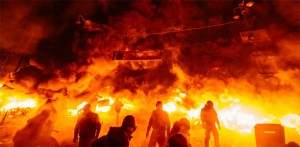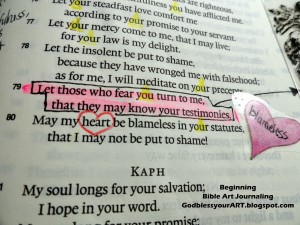I had a professor who had a great saying: “Let the music sing you.” In other words, let the art move you, speak through you. There is no need for you to bring meaning, it already has its own.
Even though we don’k know the actual meaning of Selah, it is safe to assume it is a musical term, since it is only found within lyrics. The New Living Translation takes a bold step by translating it as Interlude. So buried within the Psalms, David and the other Psalmists ask us to pause a moment from the words and let the music carry you.
Unfortunately we live in a time when letting the music carry us is usually obliterated by a worship leader or praise team singer inserting an unrelated phrase like “Thank You Jesus,” or “Praise You Jesus.” Now there is nothing wrong with praising Jesus or thanking Jesus, but is that what the song was saying? Is that what the song wants us to ponder? Probably not, but people standing before the congregation just can’t let an instrumental interlude slip by without inserting some sort of vocal interruption.
Now I can hear the objections; “But the Spirit was moving me to sing there.” But what if He wanted you to listen, to ponder. Let’s face it, few of us are not very good at “Being still.” Especially in the middle of a song. But isn’t stillness part of worship? Cannot God speak in ways other than words?
There are 74 occurrences of the this word in the OT, 71 of them in the Psalms and 3 in Habakkuk—who knew, Habakkuk! (Well, I didn’t know.) I would encourage you to look up an occurrence of the word, and examine the context. Where does the interlude fall within the song? What preceded it? Is there something there we need to be still and ponder?
Psalm 3 is brief, but there are three occurrences of Selah in eight verses. What is God saying between the words? Think about it.
1 O Lord, I have so many enemies; so many are against me. 2 So many are saying, “God will never rescue him!” Interlude
3 But you, O Lord, are a shield around me; you are my glory, the one who holds my head high. 4 I cried out to the Lord, and he answered me from his holy mountain. Interlude
5 I lay down and slept, yet I woke up in safety, for the Lord was watching over me. 6 I am not afraid of ten thousand enemies who surround me on every side. 7 Arise, O Lord! Rescue me, my God! Slap all my enemies in the face! Shatter the teeth of the wicked! 8 Victory comes from you, O Lord. May you bless your people. Interlude

 Last time, we discovered that the context of this verse places you squarely in the middle of a war. Maybe it’s for soldiers who are literally in the midst of a battle; or maybe it IS the end of the world as we know it; or it could be the spiritual battles that you’re in the midst of, which are seeking to overwhelm your soul and your heart. But Cease Striving does not merely call you to stop in the middle of a busy day; it calls you to stop whatever you’re doing, even in the midst of warfare.
Last time, we discovered that the context of this verse places you squarely in the middle of a war. Maybe it’s for soldiers who are literally in the midst of a battle; or maybe it IS the end of the world as we know it; or it could be the spiritual battles that you’re in the midst of, which are seeking to overwhelm your soul and your heart. But Cease Striving does not merely call you to stop in the middle of a busy day; it calls you to stop whatever you’re doing, even in the midst of warfare. The next thing that God brought was desolations in the earth. Now this word can also be translated as destruction, horror, and waste. Pretty intense. And why does he do this? To end the wars.
The next thing that God brought was desolations in the earth. Now this word can also be translated as destruction, horror, and waste. Pretty intense. And why does he do this? To end the wars. Praise the Lord! Give thanks to the Lord, for He is good! His faithful love endures forever. Who can list the glorious miracles of the Lord? Who can ever praise Him enough? (Ps 106:1-2)
Praise the Lord! Give thanks to the Lord, for He is good! His faithful love endures forever. Who can list the glorious miracles of the Lord? Who can ever praise Him enough? (Ps 106:1-2) This Psalm was written by Asaph, who was a Levite in the service of King David. He was also a drummer, and spent a lot of time serving before the ark of the LORD.
This Psalm was written by Asaph, who was a Levite in the service of King David. He was also a drummer, and spent a lot of time serving before the ark of the LORD. Life often pulls us in opposite directions. Verse 2 in this Psalm is actually repeated by David in verse 6. And reading it, you may get the sense that David is patiently waiting on the LORD, just being still. But between verse 2 and 6 are verses 3 and 4, and here we discover the context:
Life often pulls us in opposite directions. Verse 2 in this Psalm is actually repeated by David in verse 6. And reading it, you may get the sense that David is patiently waiting on the LORD, just being still. But between verse 2 and 6 are verses 3 and 4, and here we discover the context: With every bone in my body. When I looked up the word for bone in the Hebrew, it meant…bone. But it also means (as secondary translations) body, limbs, self and strength. That’s a pretty significant commitment for praise. And when you add the word every, which is also translated as whole, all, completely, anything, whatever and whenever, the praise become totally consuming.
With every bone in my body. When I looked up the word for bone in the Hebrew, it meant…bone. But it also means (as secondary translations) body, limbs, self and strength. That’s a pretty significant commitment for praise. And when you add the word every, which is also translated as whole, all, completely, anything, whatever and whenever, the praise become totally consuming. My soul is among lions; I must lie among those who breathe forth fire, even the sons of men, whose teeth are spears and arrows and their tongue a sharp sword. Be exalted above the heavens, O God; let Your glory be above all the earth. They have prepared a net for my steps; my soul is bowed down; They dug a pit before me. (vs. 4-6)
My soul is among lions; I must lie among those who breathe forth fire, even the sons of men, whose teeth are spears and arrows and their tongue a sharp sword. Be exalted above the heavens, O God; let Your glory be above all the earth. They have prepared a net for my steps; my soul is bowed down; They dug a pit before me. (vs. 4-6)
 Context is critical when it comes to determine the actual meaning of a scriptural passage, and how it is to be applied. I love getting wrapped up in individual words and their meanings and nuances, but if I lose sight of the context, then I commit a grave error as described in the idiom: “Can’t see the forest for the trees”, which reminds us that we need perspective, we need context.
Context is critical when it comes to determine the actual meaning of a scriptural passage, and how it is to be applied. I love getting wrapped up in individual words and their meanings and nuances, but if I lose sight of the context, then I commit a grave error as described in the idiom: “Can’t see the forest for the trees”, which reminds us that we need perspective, we need context. Last week I mentioned how context is critical to understanding and applying Scripture. I then showed the what the above verse was sandwiched in between:
Last week I mentioned how context is critical to understanding and applying Scripture. I then showed the what the above verse was sandwiched in between: